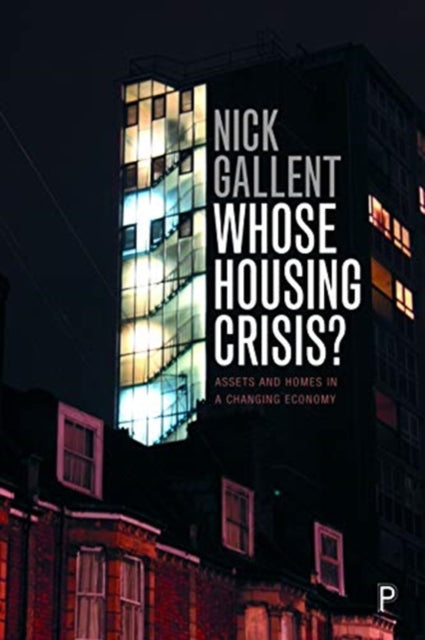NickGallent
Whose Housing Crisis?: Assets and Homes in a Changing Economy
Whose Housing Crisis?: Assets and Homes in a Changing Economy
YOU SAVE £4.01
- Condition: Brand new
- UK Delivery times: Usually arrives within 2 - 3 working days
- UK Shipping: Fee starts at £2.39. Subject to product weight & dimension
Bulk ordering. Want 15 or more copies? Get a personalised quote and bigger discounts. Learn more about bulk orders.
Couldn't load pickup availability
- More about Whose Housing Crisis?: Assets and Homes in a Changing Economy
The housing crisis is caused by the conflict between people's need for a home and the property's economic value. This has led to social inequality and governments trying to keep house prices high.
Format: Paperback / softback
Length: 192 pages
Publication date: 24 April 2019
Publisher: Policy Press
The housing crisis, a complex and multifaceted issue, can be traced back to the intricate relationship between individuals, economies, and residential property. While housing serves a vital social purpose as a place to call home, its economic function often takes precedence, overshadowing its role in providing shelter and security for individuals. This problematic relationship has led to a range of issues, including social inequality, financial instability, and environmental degradation.
At the heart of the housing crisis lies the commodification of housing, where it is viewed primarily as an asset, capable of generating wealth and providing a hedge against economic uncertainties. This economic perspective has led to the prioritization of housing as a source of investment and equity release for individuals, as well as a means to sustain consumer confidence and boost economic growth. However, this refunctioning of housing has had far-reaching consequences, contributing to social inequality.
Housing has become a place where wealth is parked and extracted, with rising house prices serving as a marker of economic success and social status. As governments strive to maintain house prices on an upward track, they implement policies that favor investors and wealthier individuals, while leaving lower-income households and renters at a disadvantage. This has led to a widening gap between the rich and the poor, with access to affordable housing becoming increasingly limited.
Furthermore, the housing crisis has environmental implications. The construction and maintenance of residential properties contribute to carbon emissions, waste generation, and resource depletion. The demand for housing, driven by economic growth and population growth, has led to the expansion of urban areas, leading to deforestation, pollution, and habitat loss.
To address the housing crisis, it is essential to recognize the complex relationship between individuals, economies, and residential property. We need to shift our perspective from housing as an asset to housing as a human right and a vital component of sustainable development. This requires a comprehensive approach that addresses the social, economic, and environmental dimensions of housing.
One solution to the housing crisis is to prioritize the provision of affordable housing for all individuals, regardless of their income or social status. This can be achieved through a combination of public policies, such as rent control, housing subsidies, and land reform, as well as private sector initiatives, such as community-led housing projects and affordable housing developments.
In addition, we need to address the commodification of housing and promote sustainable development practices. This can include promoting energy-efficient building practices, promoting mixed-income and mixed-use developments, and implementing green building standards to reduce carbon emissions and promote environmental sustainability.
Furthermore, we need to address the root causes of the housing crisis, such as income inequality, unemployment, and poverty. This requires a comprehensive social and economic policy that addresses the root causes of inequality and provides support for those who are most vulnerable.
In conclusion, the housing crisis is a complex and multifaceted issue that requires a comprehensive and collaborative approach. By recognizing the social purpose of housing, addressing the commodification of housing, promoting affordable housing, and addressing the root causes of inequality, we can create a more just and sustainable housing system for all individuals.
Weight: 290g
Dimension: 229 x 148 x 11 (mm)
ISBN-13: 9781447346074
This item can be found in:
UK and International shipping information
UK and International shipping information
UK Delivery and returns information:
- Delivery within 2 - 3 days when ordering in the UK.
- Shipping fee for UK customers from £2.39. Fully tracked shipping service available.
- Returns policy: Return within 30 days of receipt for full refund.
International deliveries:
Shulph Ink now ships to Australia, Belgium, Canada, France, Germany, Ireland, Italy, India, Luxembourg Saudi Arabia, Singapore, Spain, Netherlands, New Zealand, United Arab Emirates, United States of America.
- Delivery times: within 5 - 10 days for international orders.
- Shipping fee: charges vary for overseas orders. Only tracked services are available for most international orders. Some countries have untracked shipping options.
- Customs charges: If ordering to addresses outside the United Kingdom, you may or may not incur additional customs and duties fees during local delivery.


